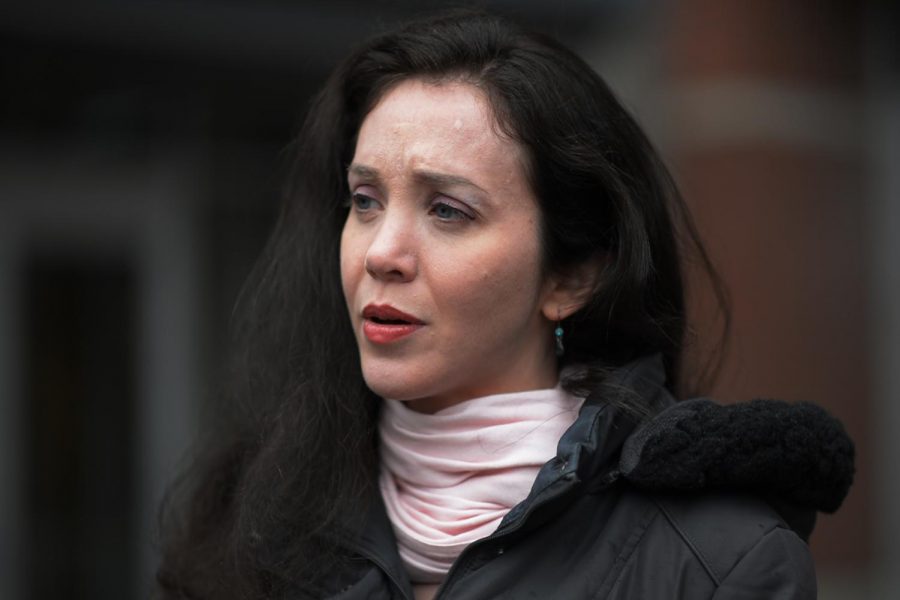Local wants to raise brain injury awareness
Head trauma especially common among athletes, combat vets
ABBY LINNENKOHL | The Daily Evergreen
Daniella Clark, a survivor of a traumatic brain injury, explains how her scar affected her self-image, altered her stamina and ability to function Wednesday outside the CUE.
January 25, 2018
Writer, musician and public speaker Daniella Clark, who represents southeastern Washington on the state’s Traumatic Brain Injury Council, wants people to understand the link between traumatic brain injuries and mental health and what can be done to get help.
“I’d like to see increased awareness throughout the state,” Clark said.
Clark suffered a severe concussion seven years ago while downhill skiing. The accident caused her to have post-concussive syndrome, trouble sleeping, headaches and affected stamina.
She learned of an organization for people with traumatic brain injuries, and was able to connect with concussion specialists who have helped her recover.
Dr. Karen Ann Stanek, physiatrist, owner and medical director of NW Medical Rehabilitation, said concussions are the most common type of TBI.
Stanek, who specializes in physical medicine and rehabilitation, said tests like CAT scans can come out negative even if someone has a TBI, so it is important to pay attention to symptoms like dizziness, memory problems and trouble focusing.
She said people with TBIs need to know they cannot force their body to go at the same pace as it did before their head injury.
“They have to know that you cannot rush healing of a head injury,” Stanek said. “It’s a process.”
Stanek also said there is a link between head injuries and mental health, the most common being increased anxiety, depression and anger.
“Oftentimes a traumatic head injury can unmask a hidden mental disorder,” Stanek said.
Clark said one in four people with head injuries have suicidal urges and two thirds report feeling depressed. Some have experienced these feelings before, but not the majority.
TBIs are especially common among combat veterans and athletes. She said one in four combat veterans has had a brain injury. There were 244 diagnosed concussions in 2016 among the NFL’s nearly 1,700 players, according to the league’s injury data.
A lot goes into treating head injuries, Stanek said.
“The treatment for traumatic brain injury is multi-faceted,” she said. “It’s not like healing a broken bone.”
She said the brain basically controls everything the body does, so it is important to work with a neurologist or physiatrist who can lead those with head injuries down the road of recovery. Stanek mentioned occupational, speech and psychological therapy might also be necessary if the injury extends beyond the head.
Though she feels the general population is not as informed about TBIs as it should be, Clark said the WSU sports program as well, as the NFL, are creating a lot of awareness about concussions.
“WSU has a concussion protocol that I’m really happy to see enforced,” she said.
She said there are services and support for people who have had head injuries to recover and rehabilitate. For example, Pullman Regional Hospital has a TBI and concussion support group that meets the fourth Monday of every month. The group is a space for people with TBIs to talk with others going through similar situations.
Clark said it is important for people with TBIs to recognize and accept that they have one in order to get access to help. By making the connection between head injuries and mental health, she said, people affected by TBIs can begin to heal, as can family members going through the process with them.
“It’s nothing to be ashamed of,” Clark said. “Rather, it’s something to seek out support for.”









